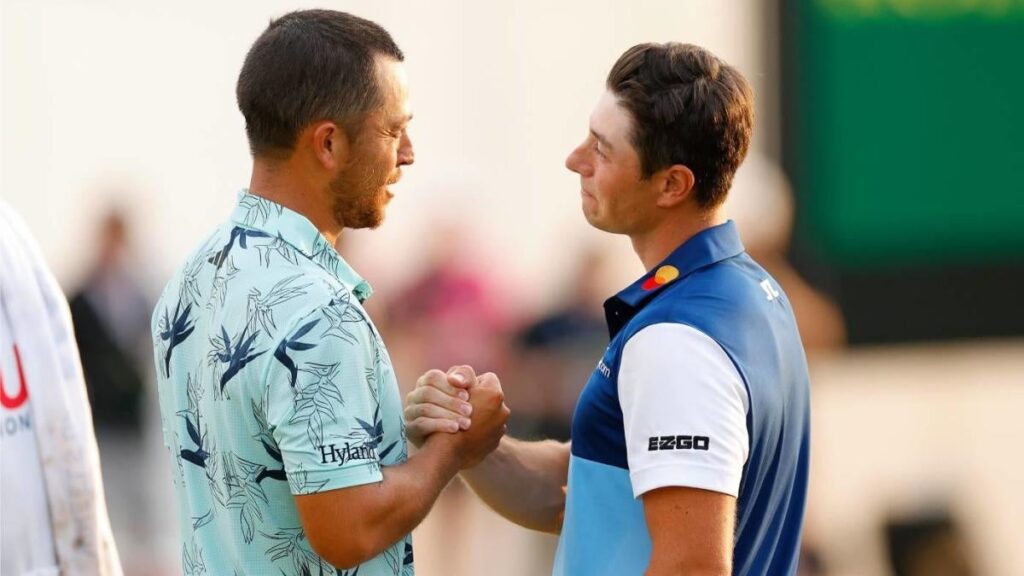Watching the Ryder Cup but not quite sure what format they’re playing?
You’re not alone. Every two years, millions of golf fans tune into the Ryder Cup and hear terms like “foursomes” and “fourball” tossed around. The passion is electric, the uniforms are sharp, and the pressure is massive. But unless you’re already deep into match play formats, it can be tough to follow exactly what’s going on.
So let’s break it down. Here’s everything you need to know about the different match formats used at the Ryder Cup so you can enjoy the action like a pro this September.
First things first: this is match play
The Ryder Cup is not stroke play like most PGA Tour events. Instead of counting total strokes over 18 holes, the format is match play, where players or teams compete to win individual holes. The player or team who wins the most holes wins the match.
Each match is worth one point. If it’s tied after 18 holes, each side earns half a point. The first team to reach 14.5 points wins the Ryder Cup. If the defending champion finishes with 14 points, they retain the Cup.
Now let’s dive into the formats.
Fourball (also called better ball)
This is what most casual golfers know as “best ball,” but the official Ryder Cup term is fourball.
- Two players from Team USA play against two players from Team Europe
- Each golfer plays their own ball throughout the hole
- The lowest score of the two players on each team counts as the team’s score
- The team with the lowest score on the hole wins that hole
Example:
- Player A (USA) makes par
- Player B (USA) makes bogey
- Player C (Europe) makes par
- Player D (Europe) makes birdie
Team Europe wins the hole because the best score (birdie) belongs to them.
Strategy tip: This format rewards aggressive play. One player can go for risky shots knowing their teammate might have a safe score in the bag.
Number of matches:
- 4 matches on Friday
- 4 matches on Saturday
Foursomes (also called alternate shot)
This is one of the most unique and pressure-packed formats in golf.
- Two players from each team form a pair
- Each team plays one ball per hole
- Players take turns hitting shots, alternating who hits from the tee on odd and even holes
- The team with the lowest total strokes on the hole wins the hole
Example:
- Player A tees off
- Player B hits the second shot
- Player A hits the third
- Player B putts
Strategy tip: Communication and chemistry are everything. It’s not just about hitting great shots, it’s about setting your partner up for success.
Foursomes are the most demanding format mentally and emotionally, which is why you’ll often see experienced or well-matched pairs selected for these sessions.
Number of matches:
- 4 matches on Friday
- 4 matches on Saturday

Singles
Singles are straightforward one-on-one match play.
- On Sunday, all 12 players from each team go head-to-head
- Each match is worth one point
- It’s simple: win more holes than your opponent over 18, and you win the match
This is the most familiar format for most golf fans. It’s where heroes are made, and legacies are cemented. Singles Sunday has delivered some of the most iconic Ryder Cup moments in history, from Justin Leonard’s putt in 1999 to Rory McIlroy’s emotional wins and losses.
Number of matches:
- 12 matches on Sunday
Recap: Ryder Cup formats by day
| Day | Morning | Afternoon |
|---|---|---|
| Friday | Fourball (4) | Foursomes (4) |
| Saturday | Fourball (4) | Foursomes (4) |
| Sunday | — | Singles (12) |
Total Matches: 28
- 8 fourball
- 8 foursomes
- 12 singles
Why does it feel so intense?
Every shot counts. In match play, there’s no safety net of “I can make it up later.” A single bad hole can swing momentum and affect the mood of the entire team. Add in national pride, crowd noise, and the fact that players are competing not for prize money but for legacy, and you’ve got golf’s most emotional and competitive stage.
It’s also a rare chance to see team golf at the highest level. Watching players work together, encourage each other, and even argue a little creates drama that you don’t get week to week on tour.
Terms you might hear during coverage
- Dormie: When a player or team leads by the same number of holes left to play, meaning they can’t lose unless they collapse
- All square: The match is tied
- Halve the hole: Both sides made the same score
- Concession: A putt or even an entire hole can be conceded to an opponent
These are part of match play etiquette and strategy. For example, a short putt may be conceded to keep pace of play or reduce tension, while other times players may force opponents to putt everything out.
Final thoughts
Understanding the Ryder Cup formats adds a whole new layer of appreciation to the event. You’ll recognize why a player might lay up instead of go for the green, or why some teammates are paired together year after year. Fourball brings fireworks. Foursomes tests nerves. Singles finishes it all.
This September, when the Ryder Cup tees off, you’ll know exactly what’s happening and why it matters. So grab a coffee (or a beer), get comfy, and enjoy one of golf’s greatest showcases.
Let’s hear from you
Do you prefer watching the strategy of foursomes or the firepower of fourball? What are your favorite Ryder Cup moments? Drop your thoughts and predictions for this year’s event.
